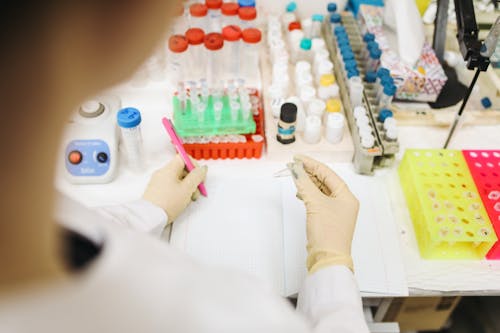The intersection of biotechnology and technology is transforming the healthcare landscape, offering new opportunities to improve patient care, enhance medical research, and address global health challenges. Innovations like CRISPR gene editing, wearable health technology, and artificial intelligence are pushing the boundaries of what is possible in the world of medicine. In this article, we explore how technology is shaping the future of healthcare and what these advancements mean for patients, doctors, and researchers.
1. CRISPR Gene Editing: Revolutionizing Genetic Medicine
One of the most exciting developments in biotechnology is the advent of CRISPR-Cas9 gene-editing technology. CRISPR (Clustered Regularly Interspaced Short Palindromic Repeats) allows scientists to precisely alter the DNA of living organisms, offering the potential to cure genetic diseases, enhance agricultural productivity, and even bring about the possibility of designer babies.
How CRISPR Works
CRISPR works by using a special enzyme (Cas9) to act like molecular scissors, cutting DNA at specific points. Scientists can then modify or replace the faulty genes responsible for diseases. The precision and efficiency of CRISPR make it a groundbreaking tool in genetics.
Potential Medical Applications:
- Genetic Disease Treatment: CRISPR has the potential to cure hereditary diseases such as sickle cell anemia, cystic fibrosis, and muscular dystrophy by correcting defective genes.
- Cancer Therapy: By editing immune cells to better recognize and attack cancer cells, CRISPR could offer new treatment options for cancers that are difficult to treat with traditional therapies.
- Preventing Inherited Diseases: Gene editing could prevent diseases from being passed down to future generations, eliminating certain genetic disorders before birth.
Ethical Considerations
While CRISPR offers exciting possibilities, it also raises ethical questions. Issues like germline editing (modifying genes in embryos), potential designer babies, and gene patenting are controversial topics that require careful regulation and consideration.
2. Wearable Health Technology: A New Era of Personalized Medicine
Wearable health technology is transforming the way people monitor their health and well-being. Devices like smartwatches, fitness trackers, and specialized health monitors have made it easier than ever for individuals to track their vital signs, physical activity, and even manage chronic conditions in real-time.
Key Wearable Technologies:
- Smartwatches (e.g., Apple Watch, Fitbit): These devices now come equipped with features like heart rate monitoring, ECG readings, sleep tracking, and blood oxygen monitoring. The Apple Watch can even detect irregular heart rhythms and alert the user to seek medical attention, potentially saving lives.
- Continuous Glucose Monitors (CGMs): For people with diabetes, wearable CGMs provide real-time data on blood sugar levels, allowing for better management of the condition without the need for frequent finger pricks.
- Smart Clothing: Companies are developing textiles embedded with sensors that monitor health metrics like heart rate, body temperature, and muscle activity, offering a new layer of personalized healthcare.
- Biofeedback Devices: These devices help users track physiological processes like stress levels and respiratory rate, enabling users to adjust their behavior or seek therapeutic interventions when necessary.
The Benefits of Wearables in Healthcare:
- Chronic Disease Management: Wearable devices enable real-time monitoring of conditions like diabetes, hypertension, and cardiovascular diseases, improving the accuracy and timeliness of treatment.
- Prevention and Early Detection: With continuous monitoring, wearables can help detect early signs of potential health problems, allowing for preventative care or early interventions.
- Data-Driven Insights: Wearables provide valuable data that can be analyzed by healthcare providers to create personalized treatment plans tailored to the individual’s unique health profile.

3. Artificial Intelligence (AI) in Healthcare: Transforming Diagnostics and Treatment
Artificial intelligence (AI) is playing a transformative role in healthcare, assisting doctors and researchers in diagnosing diseases, developing personalized treatment plans, and predicting outcomes. AI algorithms can process vast amounts of medical data, including medical images, genetic information, and patient history, to uncover insights that would be difficult for human practitioners to identify.
Key Applications of AI in Healthcare:
- Medical Imaging and Diagnostics: AI-powered tools like DeepMind (developed by Google) can analyze medical images, such as X-rays, MRIs, and CT scans, to detect signs of diseases like cancer, heart disease, and neurological disorders. These tools can often detect conditions at earlier stages, improving the chances of successful treatment.
- Predictive Analytics: AI systems can analyze patient data to predict the likelihood of certain conditions or complications, enabling proactive care. For instance, AI algorithms can assess a patient’s risk of a heart attack based on factors like age, blood pressure, cholesterol levels, and genetics.
- Personalized Treatment Plans: By analyzing a patient’s unique genetic makeup, AI can help develop personalized treatment plans that maximize the chances of success while minimizing potential side effects.
- Robotic Surgery: AI-powered robots are enhancing the precision and efficiency of surgical procedures. These robotic systems can assist surgeons in performing minimally invasive surgeries with greater accuracy, leading to faster recovery times and fewer complications.
Challenges and Concerns:
- Data Privacy: As AI systems rely on vast amounts of patient data, ensuring data privacy and security is crucial. Unauthorized access or breaches could have serious consequences for individuals and the healthcare industry.
- Bias and Fairness: AI algorithms can unintentionally inherit biases from the data they are trained on, leading to inaccurate or unfair outcomes, particularly for underrepresented groups.
- Regulation: The use of AI in healthcare requires careful regulation to ensure that these technologies are safe, effective, and ethically deployed.
4. Telemedicine and Remote Healthcare: Expanding Access to Care
The COVID-19 pandemic accelerated the adoption of telemedicine, allowing patients to consult with doctors remotely via video calls, phone consultations, or messaging. This has been especially beneficial for individuals in rural or underserved areas who may have difficulty accessing healthcare in person.
The Role of Telemedicine:
- Remote Consultations: Patients can now access healthcare providers from the comfort of their own homes, reducing the need for in-person visits and making healthcare more accessible to people with mobility issues, busy schedules, or geographic limitations.
- Monitoring Chronic Conditions: Telemedicine can be combined with remote monitoring tools (such as wearables and connected medical devices) to track chronic conditions like diabetes, hypertension, and asthma. This allows for continuous care and early intervention without the need for frequent office visits.
- Mental Health Support: Virtual therapy and counseling sessions have become more common, helping individuals access mental health support when they might otherwise face barriers like stigma or lack of local providers.
The Future of Telemedicine:
As 5G connectivity continues to expand, telemedicine will become even more seamless and real-time, allowing for even higher-quality video consultations and real-time health monitoring. This will likely lead to even greater access to healthcare, particularly in remote and underserved regions.
5. The Role of Biotechnology in Drug Development
Advancements in biotechnology are not only changing how diseases are diagnosed and treated but also how new drugs are developed. Biopharmaceuticals are drugs produced through biotechnology methods, including recombinant DNA technology and monoclonal antibody production. These drugs are often used to treat complex diseases like cancer, autoimmune disorders, and rare genetic conditions.
Key Innovations in Biotechnology Drug Development:
- Gene Therapy: Gene therapy uses biotechnology to correct or replace defective genes in patients with genetic disorders. One example is Luxturna, a gene therapy for inherited retinal disease, which restores vision by inserting a functional copy of the gene responsible for vision.
- Monoclonal Antibodies: These are lab-made molecules that can mimic the immune system’s ability to fight off harmful pathogens like cancer cells and viruses. Keytruda and Opdivo, for example, are monoclonal antibodies used in cancer treatment.
- RNA-Based Vaccines: The rapid development of mRNA vaccines for COVID-19 demonstrated the potential of biotechnology to create vaccines quickly and effectively. mRNA technology could also be used in treatments for cancer and genetic diseases in the future.

Conclusion
The intersection of biotechnology and technology is opening up new frontiers in healthcare, making treatments more personalized, precise, and accessible. From CRISPR gene editing and wearable health technology to artificial intelligence and telemedicine, these innovations are transforming the way we approach health, disease, and patient care. As research continues and new technologies emerge, the future of healthcare holds the promise of better, more effective treatments and a healthier, more connected world. However, as with all innovations, careful regulation, ethical considerations, and attention to data privacy will be essential to ensure that these advancements are used responsibly and benefit all individuals.














